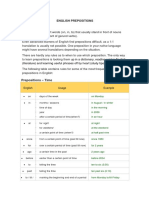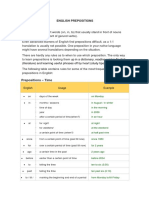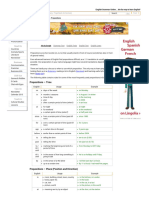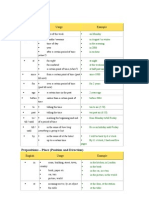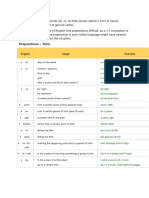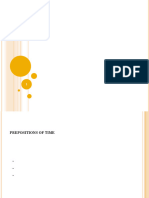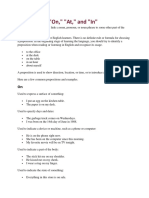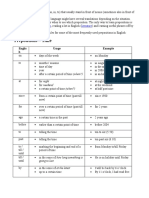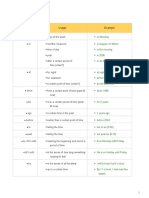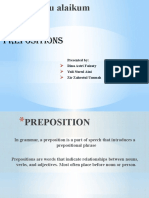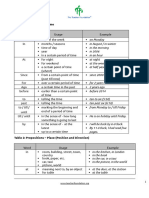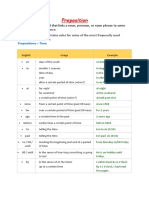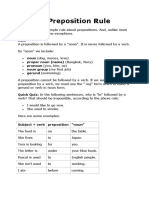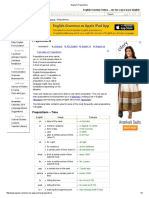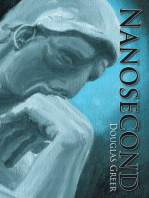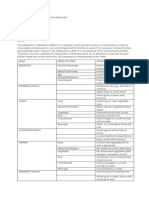6 Best Corner Project
6 Best Corner Project
Uploaded by
Iffah AmaniCopyright:
Available Formats
6 Best Corner Project
6 Best Corner Project
Uploaded by
Iffah AmaniCopyright
Available Formats
Share this document
Did you find this document useful?
Is this content inappropriate?
Copyright:
Available Formats
6 Best Corner Project
6 Best Corner Project
Uploaded by
Iffah AmaniCopyright:
Available Formats
Prepositions
Some common prepositions are:
about by outside
above despite over
across down past
after during since
against except through
along for throughout
among from till
around in to
at inside toward
before into under
behind like underneath
below near until
beneath of up
beside off upon
between on with
beyond onto within
but out without.
Prepositions typically come before a noun:
For example:
after class
at home
before Tuesday
in London
on fire
with pleasure
A preposition usually indicates the temporal, spatial or logical relationship of its object to the
rest of the sentence.
For example:
The book is on the table.
The book is beside the table.
She read the book during class.
In each of the preceding sentences, a preposition locates the noun "book" in space or
in time.
Prepositions are classified as simple or compound.
Simple prepositions
Simple prepositions are single word prepositions. These are all showed above.
For example:
The book is on the table.
Compound prepositions
Compound prepositions are more than one word. in between and because of are
prepositions made up of two words - in front of, on behalf of are prepositions made up of
three words.
For example:
The book is in between War and Peace and The Lord of the Rings.
The book is in front of the clock.
Examples:
The children climbed the mountain without fear.
There was rejoicing throughout the land when the government was defeated.
The spider crawled slowly along the banister.
The following table contains rules for some of the most frequently used prepositions in
English:
Prepositions of Time:
English Usage Example
on days of the week on Monday
in months / seasons in August / in
time of day winter
year in the morning
after a certain period of in 2006
time (when?) in an hour
at for night at night
for weekend at the weekend
a certain point of at half past nine
time(when?)
since from a certain point of time since 1980
(past till now)
for over a certain period of time for 2 years
(past till now)
ago a certain time in the past 2 years ago
before earlier than a certain point before 2004
of time
to telling the time ten to six (5:50)
past telling the time ten past six (6:10)
to / till / marking the beginning and from Monday to/till
until end of a period of time Friday
till / until in the sense of how long He is on holiday
something is going to last until Friday.
by in the sense of at the latest I will be back by 6
up to a certain time o’clock.
By 11 o'clock, I had
read five pages.
Prepositions of Place:
English Usage Example
in room, building, street, town, in the kitchen, in
country London
book, paper etc. in the book
car, taxi in the car, in a taxi
picture, world in the picture, in the
world
at meaning next to, by an at the door, at the
object station
for table at the table
for events at a concert, at the
place where you are to do party
something typical (watch a at the cinema, at
film, study, work) school, at work
on attached the picture on the
for a place with a river wall
being on a surface London lies on the
for a certain side (left, right) Thames.
for a floor in a house on the table
for public transport on the left
for television, radio on the first floor
on the bus, on a
plane
on TV, on the radio
by, next to, left or right of somebody or Jane is standing by /
beside something next to / beside the
car.
under on the ground, lower than the bag is under the
(or covered by) something table
else
below lower than something else the fish are below
but above ground the surface
over covered by something else put a jacket over
meaning more than your shirt
getting to the other side over 16 years of age
(also across) walk over the bridge
overcoming an obstacle climb over the wall
above higher than something else, a path above the
but not directly over it lake
across getting to the other side walk across the
(also over) bridge
getting to the other side swim across the lake
through something with limits on top, drive through the
bottom and the sides tunnel
to movement to person or go to the cinema
building go to London /
movement to a place or Ireland
country go to bed
for bed
into enter a room / a building go into the kitchen /
the house
towards movement in the direction of go 5 steps towards
something (but not directly the house
to it)
onto movement to the top of jump onto the table
something
from in the sense of where from a flower from the
garden
Uncountable Nouns
For example:
How much time did it take for you to drive to school?.
Here, time is a non-count noun, because it refers to a category that contains smaller
items (think of it as a "group" of minutes).
How many times did you take the test before you passed?.
Here, time is a count noun, because you can count exactly how many separate
times you took the test.
They had a death in the family.
Death is a tragic thing.
Supermarkets have aisles for different foods.
The animals at the zoo wanted food.
The "much" and "many" Rule
Many is used with count nouns.
For example:
How many papers do you have to write?
There were too many books required for that class.
Much is used with non-count nouns.
For example:
How much homework did you have last night?
I had to read so much literature for my English class.
You can use "some" and "any" with uncountable nouns.
For example:
I usually drink some milk with my meal.
I don't usually drink while eating.
‘[[
You only use "much" and "little" with uncountable nouns.
For example:
I don't usually drink much coffee.
Little coffee is undrinkable though.
You can use "a lot of" and "no" with uncountable nouns.
For example:
A lot of coffee is drunk in France.
No coffee is drunk in Iran.
Countable Nouns
For example:
How much time did it take for you to drive to school?.
Here, time is a non-count noun, because it refers to a category that contains smaller
items (think of it as a "group" of minutes).
How many times did you take the test before you passed?.
Here, time is a count noun, because you can count exactly how many separate
times you took the test.
They had a death in the family.
Death is a tragic thing.
Supermarkets have aisles for different foods.
The animals at the zoo wanted food.
The "much" and "many" Rule
Many is used with count nouns.
For example:
How many papers do you have to write?
There were too many books required for that class.
Much is used with non-count nouns.
For example:
How much homework did you have last night?
I had to read so much literature for my English class.
You can use "some" and "any" with countable nouns.
For example:
Some dogs can be dangerous.
I don't use any computers at work.
You only use "many" and "few" with plural countable nouns.
For example:
Many elephants have been hunted.
There are few elephants in England.
You can use "a lot of" and "no" with plural countable nouns.
For example:
No computers were bought last week.
A lot of computers were reported broken the week before.
You might also like
- Wild Edibles and Medicinal Herbs You Can Forage For or Find Around Your HouseDocument49 pagesWild Edibles and Medicinal Herbs You Can Forage For or Find Around Your HouseSumaya WebsterNo ratings yet
- Independent University, Bangladesh: Name IDDocument17 pagesIndependent University, Bangladesh: Name IDNafisa IslamNo ratings yet
- PREPOSITIONSDocument5 pagesPREPOSITIONSshareenNo ratings yet
- Up in A Dictionary, Reading A Lot in English (Literature) and Learning Useful Phrases Off by Heart (Study Tips)Document4 pagesUp in A Dictionary, Reading A Lot in English (Literature) and Learning Useful Phrases Off by Heart (Study Tips)Gregorio OspinaNo ratings yet
- Up in A Dictionary, Reading A Lot in English (Literature) and Learning Useful Phrases Off by Heart (Study Tips)Document4 pagesUp in A Dictionary, Reading A Lot in English (Literature) and Learning Useful Phrases Off by Heart (Study Tips)Angela Maria Guerra BenjumeaNo ratings yet
- English PrepositionsDocument3 pagesEnglish PrepositionsAinul MahbubillahNo ratings yet
- Examples of PrepoDocument3 pagesExamples of PrepoSimrun Singh AuroraNo ratings yet
- Prepositions - Time: English Usage ExampleDocument4 pagesPrepositions - Time: English Usage ExampleVero ScharffNo ratings yet
- Adeel Raza Functional EnglishDocument10 pagesAdeel Raza Functional EnglishAdeel RazaNo ratings yet
- Materi & Soal PrepositionDocument5 pagesMateri & Soal PrepositionAndi Eko YuliantoroNo ratings yet
- PrepositionsDocument9 pagesPrepositionssubhasedu100% (1)
- PrepositionsDocument6 pagesPrepositionsSadia SifatNo ratings yet
- Prepositions: Präpositions - TimeDocument4 pagesPrepositions: Präpositions - Timemay ehabNo ratings yet
- English Language-4 Preposition: PrepositionsDocument6 pagesEnglish Language-4 Preposition: PrepositionssanjibannathNo ratings yet
- Prepositions - Time: English Usage ExampleDocument5 pagesPrepositions - Time: English Usage ExamplechaimaeNo ratings yet
- English Q4 WK4Document3 pagesEnglish Q4 WK4Jeremias MartirezNo ratings yet
- Prepositions of Time and PlaceDocument4 pagesPrepositions of Time and PlaceSarai Rojas100% (1)
- Prepositions 1Document3 pagesPrepositions 1Ali RazaNo ratings yet
- Präpositions - Time: English Usage ExampleDocument3 pagesPräpositions - Time: English Usage ExampleA. ΒρατσισταNo ratings yet
- Step Plus Final Study: No. of Questions Time (Min)Document17 pagesStep Plus Final Study: No. of Questions Time (Min)vkannan109262No ratings yet
- Preposition Definition: Prepositions Are A Class of Words That Indicate Relationships BetweenDocument6 pagesPreposition Definition: Prepositions Are A Class of Words That Indicate Relationships Betweenwasif28No ratings yet
- Prepositions, Gerunds and Inifinitives HandoutDocument9 pagesPrepositions, Gerunds and Inifinitives HandoutGloria CavaliereNo ratings yet
- Important PrepositionsDocument3 pagesImportant PrepositionsMatias DamicoNo ratings yet
- Prepositions: Dictionary Literature Study TipsDocument7 pagesPrepositions: Dictionary Literature Study TipslorraineNo ratings yet
- Prepositions of Place and TimeDocument12 pagesPrepositions of Place and TimeAlex TorresNo ratings yet
- Prepositions - Time: English Usage ExampleDocument21 pagesPrepositions - Time: English Usage ExampleSafitri EnniNo ratings yet
- English PrepositionDocument2 pagesEnglish PrepositionJeremias MartirezNo ratings yet
- Prepositions of Time Exercise at AutoDocument4 pagesPrepositions of Time Exercise at AutoCláudia OliveiraNo ratings yet
- Prepositions "On," "At," and "In"Document11 pagesPrepositions "On," "At," and "In"Muhammad Khan TagarNo ratings yet
- English - Preposition Time, Place, DirectionDocument3 pagesEnglish - Preposition Time, Place, DirectionBianca ZobNo ratings yet
- Prepositions - Time: Dictionary Literature Study TipsDocument3 pagesPrepositions - Time: Dictionary Literature Study TipsNathan MwansaNo ratings yet
- Prepositions - Time: Dictionary Literature Study TipsDocument3 pagesPrepositions - Time: Dictionary Literature Study TipsNathan MwansaNo ratings yet
- Giao An Ca NamDocument6 pagesGiao An Ca NamNhư TrầnNo ratings yet
- Preposition PDFDocument5 pagesPreposition PDFRana IrfanNo ratings yet
- Dictionary Literature Study Tips: PrepositionsDocument3 pagesDictionary Literature Study Tips: PrepositionsCosmic KatharsisNo ratings yet
- PrepositionsDocument4 pagesPrepositionsdouglas SantannaNo ratings yet
- Prepositions - Time: English Usage ExampleDocument3 pagesPrepositions - Time: English Usage ExampleLokesh NANo ratings yet
- Präpositions - Time: English Usage ExampleDocument4 pagesPräpositions - Time: English Usage ExampleJ.Gopala KrishnaNo ratings yet
- Prepositions - TimeDocument6 pagesPrepositions - TimeNur Shahirah Mohd RadziNo ratings yet
- Prepositions - Time: After A Certain Period of Time For For A Certain Point of TimeDocument2 pagesPrepositions - Time: After A Certain Period of Time For For A Certain Point of TimeSandy NayohanNo ratings yet
- Coordinating Conjunctions: For and Nor But or Yet SoDocument6 pagesCoordinating Conjunctions: For and Nor But or Yet SoZeeshan AhmedNo ratings yet
- Presented By: Rina Astri Faizaty Yuli Nurul Aini Zir Zahrotul UmmahDocument15 pagesPresented By: Rina Astri Faizaty Yuli Nurul Aini Zir Zahrotul UmmahASTRI FNo ratings yet
- PrepositionsDocument7 pagesPrepositionsЯна ГутникNo ratings yet
- Prepositions in English Grammar: Table: Prepositions of TimeDocument5 pagesPrepositions in English Grammar: Table: Prepositions of TimeDm MrkNo ratings yet
- Preposition of PlaceDocument2 pagesPreposition of PlaceBrannNo ratings yet
- PrepositionsDocument5 pagesPrepositionsThenaNo ratings yet
- List of PrepositionsDocument3 pagesList of PrepositionsG.Prathibha PrathibhaNo ratings yet
- Preposition: A Preposition Is A Word That Links A Noun, Pronoun, or Noun Phrase To Some Other Part of The SentenceDocument6 pagesPreposition: A Preposition Is A Word That Links A Noun, Pronoun, or Noun Phrase To Some Other Part of The SentenceAbhimanyu SinghNo ratings yet
- Prepositions Prepositions - Time: English UsageDocument6 pagesPrepositions Prepositions - Time: English UsageDiegoNo ratings yet
- Bai Tap Ve Gioi Tu Tieng Anh Lop 7Document21 pagesBai Tap Ve Gioi Tu Tieng Anh Lop 7Ánh NguyễnNo ratings yet
- List of PrepositionsDocument3 pagesList of PrepositionsKrisztina FrankNo ratings yet
- Prepositions 2Document33 pagesPrepositions 2Usama zafarNo ratings yet
- Prepositions - TimeDocument4 pagesPrepositions - TimeMarcio MartinsNo ratings yet
- Prepositions - Time: English Usage ExampleDocument4 pagesPrepositions - Time: English Usage ExamplelauraborhanNo ratings yet
- English PrepositionsDocument2 pagesEnglish Prepositionsstengelkurt1No ratings yet
- English Preposition RuleDocument11 pagesEnglish Preposition RuleNajeeb kakarNo ratings yet
- Class Frid (Recuperado Automáticamente)Document12 pagesClass Frid (Recuperado Automáticamente)Carlos CéspedesNo ratings yet
- English PrepositionsDocument4 pagesEnglish PrepositionsDossDossNo ratings yet
- PrepositionsDocument14 pagesPrepositionsDaffa AzzamNo ratings yet
- G-TRAX Devo's-Christian Living: Peer Pressure: Christian Living, #3From EverandG-TRAX Devo's-Christian Living: Peer Pressure: Christian Living, #3No ratings yet
- Developing Reading Power 6 of Jennet Gardiola MercadoDocument75 pagesDeveloping Reading Power 6 of Jennet Gardiola MercadoGwenn PilotonNo ratings yet
- Servsafe Managers - Chapter 2-Lesson Plan 1Document1 pageServsafe Managers - Chapter 2-Lesson Plan 1api-635175552No ratings yet
- Copia de Detalle Pedidos Rechazados AbrilDocument148 pagesCopia de Detalle Pedidos Rechazados AbrilFreddy SanchezNo ratings yet
- UASA YEAR 3 LiterasiDocument5 pagesUASA YEAR 3 LiterasiEMILY TENG JIE LING MoeNo ratings yet
- Atwaters Restaurant & LoungeDocument6 pagesAtwaters Restaurant & Loungemiviyab935No ratings yet
- Live Beat 2 - Summative Test 4ADocument4 pagesLive Beat 2 - Summative Test 4ALuanneNo ratings yet
- Laporan p5 Selesai Kel 3Document10 pagesLaporan p5 Selesai Kel 3Sukirjo Sukirjo100% (1)
- H Bailey: Text Book ForDocument354 pagesH Bailey: Text Book ForRobert ForsythNo ratings yet
- Grade 7 Tle ChecklistDocument2 pagesGrade 7 Tle ChecklistMari Ella NakantengNo ratings yet
- Au Pair InfoDocument7 pagesAu Pair Infokmiloca1205No ratings yet
- NDT Lec AssignmentDocument2 pagesNDT Lec Assignmentf2ghmztbp5No ratings yet
- CHARTER PREFERENCE INFORMATION: Form # 8456 Was Filled Out by Client ID#:1314, David BringleDocument9 pagesCHARTER PREFERENCE INFORMATION: Form # 8456 Was Filled Out by Client ID#:1314, David BringleSylviane PetitotNo ratings yet
- End of Year 1 Standard BDocument2 pagesEnd of Year 1 Standard BYONo ratings yet
- 5S ManualDocument60 pages5S ManualMun Hein ZawNo ratings yet
- Radisson Blu Beverage ListDocument4 pagesRadisson Blu Beverage ListRaj KarkiNo ratings yet
- Singh Et Al., 2015-LDocument8 pagesSingh Et Al., 2015-LLuis Alberto Canul KuNo ratings yet
- Chapter 12: Picked It UpDocument20 pagesChapter 12: Picked It UpsaducsNo ratings yet
- Hari Kantin Games & Food Price List - 8 June 2024Document5 pagesHari Kantin Games & Food Price List - 8 June 2024Kishore Kumar SugumaranNo ratings yet
- 5.5 Offshore Platform ProductionDocument14 pages5.5 Offshore Platform Productioneng20072007No ratings yet
- Conditional Sentences Exercises Type 0, 1 and 2Document1 pageConditional Sentences Exercises Type 0, 1 and 2Bunga PermataNo ratings yet
- Cabbage Chemistry: LaboratoryDocument2 pagesCabbage Chemistry: LaboratoryTrixieCamposanoNo ratings yet
- Topic 6 Accounting For Joint Products, by Products and ScrapsDocument37 pagesTopic 6 Accounting For Joint Products, by Products and ScrapsFD ReynosoNo ratings yet
- Arun Deshmukh: Professional ProfileDocument3 pagesArun Deshmukh: Professional ProfileAakansha DNo ratings yet
- Authority 2016 EFSA JournalDocument139 pagesAuthority 2016 EFSA JournalMoniz EugenioNo ratings yet
- Advertising and Promotion Canadian 6th Edition Guolla Solutions Manual 1Document10 pagesAdvertising and Promotion Canadian 6th Edition Guolla Solutions Manual 1thomas100% (53)
- Seating Arrangement & Puzzle (PDF) - RBI Grade 'B'Document187 pagesSeating Arrangement & Puzzle (PDF) - RBI Grade 'B'Aman Mishra 504 sec d50% (2)
- Biology For ss1 Second TermDocument4 pagesBiology For ss1 Second TermPius Sonny Prince OseNo ratings yet
- EN 338924 MC Connect SKMC 1200 C3 HauptbedienungsanleitungDocument40 pagesEN 338924 MC Connect SKMC 1200 C3 HauptbedienungsanleitungAurora LavuNo ratings yet



